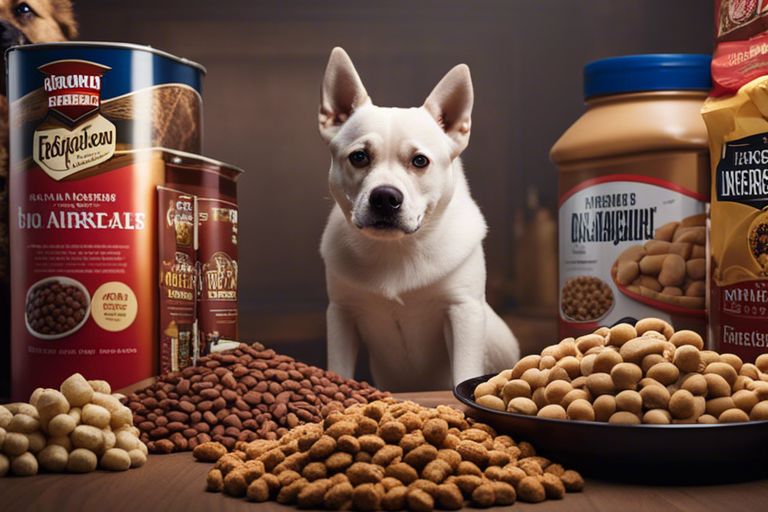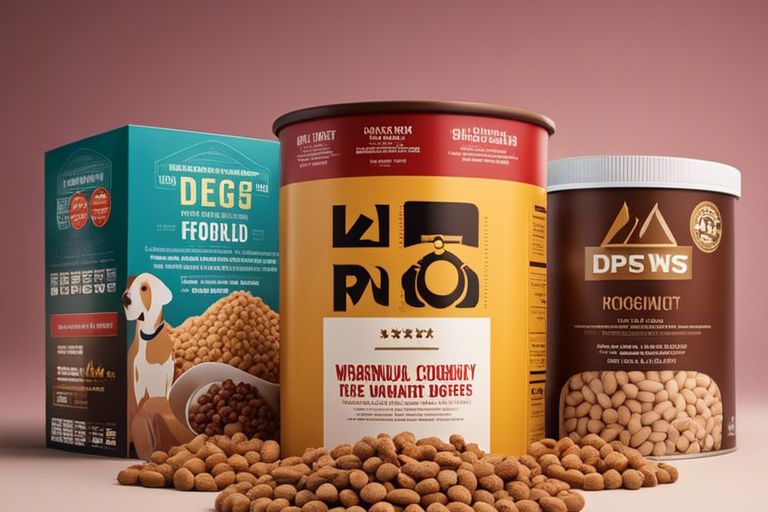Ah, the world of pet food can be a confusing one. With so many options lining the shelves, it’s hard to decipher what’s good and what’s best left untouched. In this informative post, we’ll probe the dog foods you should steer clear of to keep your furry friend happy and healthy.
Key Takeaways:
- Avoid dog foods containing artificial preservatives, colors, and flavors.
- Avoid dog foods with high levels of fillers such as corn, wheat, and soy.
- Avoid dog foods with ambiguous meat by-products or meat meals listed in the ingredients.
- Avoid dog foods that contain excessive amounts of sugar and salt.
- Avoid dog foods with a lack of recognizable whole food ingredients.
Oh, dear pet owners, when it comes to choosing the right food for your loyal four-legged friend, remember to steer clear from those sneaky dog foods that are packed with artificial nasties. Keep an eye out for those fillers like corn and soy that provide little to no nutritional value, and be wary of those mysterious meat by-products that could leave your fur baby feeling a bit ruff. If you want to keep your canine companion healthy and happy, be sure to avoid those sugary and salty options and opt for wholesome ingredients instead. Your pup deserves the best, so don’t settle for anything less!
Red Flags in Dog Food Ingredients
The 7 Ingredients to Avoid in Dog Food can have a significant impact on your dog’s health. Here are some red flags to look out for:
Artificial Preservatives and Additives
The use of artificial preservatives and additives in dog food can have harmful effects on your furry friend. Ingredients like BHA, BHT, and ethoxyquin have been linked to health issues such as cancer and liver dysfunction. Opt for dog foods that use natural preservatives like vitamin E and vitamin C to ensure your dog stays healthy and happy.
Low-Quality Protein Sources
Sources of low-quality protein in dog food can be detrimental to your dog’s overall health. Look out for ingredients like meat by-products, corn gluten meal, and soy protein, which offer little nutritional value and can be hard for your dog to digest. Opt for dog foods that use high-quality protein sources like chicken, beef, or salmon to ensure your dog gets the nutrients they need.
Understanding the importance of high-quality protein sources in your dog’s diet is crucial for their overall health and well-being. Proteins are necessary for muscle development, immune function, and energy levels in dogs. By choosing dog foods with high-quality protein sources, you can help support your dog’s overall health and ensure they have the energy they need to thrive.
Fillers and By-Products
One of the red flags to watch out for in dog food ingredients is the presence of fillers and by-products. Fillers like corn, wheat, and soy offer little to no nutritional value and can be hard for dogs to digest. By-products, such as chicken by-product meal or poultry by-product meal, are lower-quality protein sources that may not provide the necessary nutrients your dog needs. Opt for dog foods that use whole ingredients and avoid fillers and by-products to ensure your dog receives a balanced and nutritious diet.
It is necessary to be mindful of the ingredients in your dog’s food to ensure they are getting the nutrients they need to thrive. By avoiding artificial preservatives and additives, low-quality protein sources, and fillers and by-products, you can help support your dog’s overall health and well-being. Choose dog foods with high-quality, natural ingredients to keep your furry friend happy and healthy for years to come.
Common Allergens and Sensitivities
Even the healthiest dog foods can contain ingredients that may trigger allergic reactions or sensitivities in some dogs. It’s important to be aware of common allergens and sensitivities to ensure your furry friend stays happy and healthy.
Grains and Gluten
Grains, especially those containing gluten like wheat, barley, and rye, are common allergens for dogs. Some dogs may have trouble digesting grains, leading to symptoms such as skin irritation, digestive issues, and overall discomfort. If your dog has a sensitivity to grains, it’s best to opt for grain-free dog food options that use alternative sources of carbohydrates like sweet potatoes or peas.
Beef and Dairy
Gluten is another common allergen that can cause skin problems, digestive upset, and other issues in some dogs. Beef and dairy products are also known to trigger allergies in certain dogs. If your furry companion exhibits signs of allergies such as itching, ear infections, or gastrointestinal problems, it may be worth considering switching to a dog food that excludes these ingredients.
Beef and dairy are common culprits when it comes to food-related allergies in dogs. These ingredients can cause skin issues, digestive problems, and overall discomfort in sensitive pups. If you suspect your dog may be reacting to beef or dairy in their diet, try eliminating these ingredients and see if their symptoms improve.
Soy and Corn
The inclusion of soy and corn in dog food can also lead to allergic reactions and sensitivities in some dogs. Soy is a common allergen that may cause digestive issues and skin problems in certain pups. Corn, often used as a filler in dog foods, can be difficult for some dogs to digest, leading to digestive upset and potential allergies.
The best way to determine if your dog is sensitive to soy or corn is to switch to a dog food that excludes these ingredients and monitor your pet’s response. If you notice an improvement in their overall health and well-being after eliminating soy and corn from their diet, it may be best to avoid these ingredients moving forward.
Unhealthy Fats and Oils
Omega-6 Rich Ingredients
For an optimal diet for your dog, it’s important to be cautious of ingredients high in omega-6 fatty acids. While omega-6 is necessary for your dog’s health, too much of it can lead to inflammation and other health issues. Common sources of omega-6 fatty acids in dog food include corn oil, soybean oil, and sunflower oil.
Processed Fats and Oils
Rich in unhealthy fats and lacking necessary nutrients, processed fats and oils are best avoided in your dog’s diet. These fats can be found in many commercial dog foods and treats, contributing to obesity and other health problems in dogs.
With the rise of processed foods in the market, it’s crucial to read the labels carefully when selecting dog food products. Look out for terms like “hydrogenated” or “partially hydrogenated” oils, as these indicate the presence of unhealthy fats that can be harmful to your furry friend.
Lack of Omega-3 Fatty Acids
Oils lacking in omega-3 fatty acids can also be detrimental to your dog’s health. Omega-3s play a crucial role in maintaining your dog’s skin, coat, and overall well-being. Without an adequate amount of omega-3s in their diet, dogs may experience dry skin, dull coat, and increased inflammation.
Omega-3 fatty acids are typically found in fish oil, flaxseed oil, and canola oil. Including these sources of healthy fats in your dog’s diet can help prevent deficiencies and support their overall health.
Misleading Marketing Tactics
Once again, it is crucial to be aware of the marketing tactics used by dog food companies that can be misleading to consumers. The FDA has even identified 16 brands of dog food that have been linked to canine heart disease. You can find more information about this concerning issue in the article FDA names 16 brands of dog food linked to canine heart disease.
Buzzwords and False Claims
With the rise of health-conscious consumers, dog food companies often use buzzwords like “natural,” “organic,” and “grain-free” to attract buyers. However, these claims can be misleading if not backed by scientific evidence. Always look for the AAFCO statement on the packaging to ensure the food meets nutritional standards.
Misleading Labeling and Packaging
Misleading labeling and packaging can trick pet owners into thinking they are buying a high-quality product when, in reality, it may be full of fillers and unnecessary additives. Always read the ingredient list carefully and avoid products with vague terms like “meat by-products” or “animal digest.”
This is especially important for dogs with dietary restrictions or allergies, as misleading labeling can lead to adverse reactions and health issues for your pet.
Unsubstantiated Health Benefits
Claims of added vitamins, antioxidants, and supplements in dog food may sound appealing, but without proper research and verification, these claims could be unsubstantiated. Look for products that have undergone feeding trials or have scientific evidence to support their health claims.
Health should always come first when choosing a dog food, so be wary of products that promise miraculous health benefits without any proof to back them up.
Contaminated and Recalled Foods
Despite the strict regulations in place, there have been instances of contaminated and recalled dog foods that have caused harm to pets. These incidents serve as a reminder for dog owners to be vigilant about the products they feed their furry friends.
Salmonella and E. Coli Outbreaks
One of the most common contaminants found in dog foods is salmonella and E. coli. These bacteria can cause serious illnesses in dogs, including vomiting, diarrhea, and in severe cases, organ failure. It’s important for dog owners to pay attention to recall notices and stay informed about potential outbreaks.
Recalled Foods and Manufacturer Negligence
Recalled dog foods are often the result of manufacturer negligence, such as failure to meet safety standards or contamination during the production process. These incidents can have serious consequences for pets, leading to illnesses or even death. It’s crucial for dog owners to research the brands they trust and ensure that they prioritize safety in their manufacturing processes.
ColiOutbreaks linked to contaminated dog foods are a serious concern for pet owners. It’s important to stay informed about recalls and to only purchase dog foods from reputable manufacturers who prioritize safety and quality control.
Lack of Transparency in Manufacturing
Recalled dog foods often highlight a lack of transparency in the manufacturing process. Without clear information about where and how the dog food is produced, consumers are left in the dark about potential risks. Dog owners should choose brands that are transparent about their sourcing and production methods to ensure the safety of their pets.
Manufacturing processes play a crucial role in the safety of dog foods. Dog owners should look for brands that have rigorous quality control measures in place and are transparent about their production processes to avoid potential risks of contamination and recalls.
Special Dietary Needs and Restrictions
Food Sensitivities and Allergies
On your quest to find the best dog food for your furry friend, it’s vital to consider any food sensitivities or allergies they may have. Just like humans, dogs can also develop intolerances or allergies to certain ingredients. Common allergens for dogs include wheat, corn, soy, and certain protein sources like chicken or beef. If you notice your dog experiencing symptoms like itchiness, gastrointestinal upset, or chronic ear infections, it might be a sign of a food sensitivity.
Age-Specific and Breed-Specific Needs
Any responsible dog owner knows that different life stages and breeds have unique dietary requirements. Puppies, adult dogs, senior dogs, and large or small breeds all have specific nutritional needs that should be addressed in their diet. For example, puppies require diets higher in protein and calories to support their growth and development, while senior dogs may benefit from foods with joint-supporting ingredients.
Dietary adjustments may also be necessary for certain breeds that are prone to specific health conditions. For instance, large breeds may be more at risk for joint issues, so foods with added glucosamine and chondroitin can help support their joint health.
Vegetarian and Vegan Options
Any dog owners following a vegetarian or vegan lifestyle may wonder if their pets can also thrive on plant-based diets. While dogs are omnivores and can technically survive on a diet without meat, it’s vital to consult with a veterinarian or canine nutritionist before making such a significant dietary change for your pet. Dogs have specific nutritional requirements that may be challenging to meet without animal-derived products, like vital amino acids and vitamins such as B12.
Vegetarian and vegan dog foods on the market are formulated to meet these needs, often incorporating plant-based sources of protein like soy, peas, and lentils. However, it’s crucial to ensure your dog is getting all the vital nutrients they need to maintain their health and well-being on a meat-free diet.
Final Words
With these considerations in mind, it’s best to avoid dog foods that contain artificial additives, by-products, and fillers like corn, wheat, and soy. Opt for high-quality, natural ingredients that prioritize your furry friend’s health and well-being. Do not forget, a well-balanced diet plays a crucial role in your dog’s overall health and longevity.
FAQ
Q: What dog foods should I avoid?
A: You should avoid dog foods that contain artificial preservatives, colors, and flavors. These additives can be harmful to your furry friend’s health in the long run.
Q: Are grains in dog food bad for my pet?
A: Grains in dog food are not necessarily bad, but some dogs may have allergies to certain grains. It’s imperative to observe your dog’s reactions to different ingredients and consult with a veterinarian if you have concerns.
Q: Should I avoid dog foods with a high percentage of fillers?
A: Yes, you should avoid dog foods with a high percentage of fillers like corn, wheat, and soy. These fillers offer little nutritional value and can lead to digestive issues in some dogs.
Q: Is it safe to feed my dog table scraps?
A: It’s best to avoid feeding your dog table scraps, as they can be high in fat, salt, and other ingredients that are harmful to dogs. Stick to a balanced diet of high-quality dog food to ensure your pet gets all the nutrients they need.
Q: What ingredients should I look for in a healthy dog food?
A: Look for dog foods that list meat as the first ingredient, and are free from artificial additives. Ingredients like real meat, fruits, vegetables, and whole grains provide imperative nutrients for your dog’s overall health and well-being.



